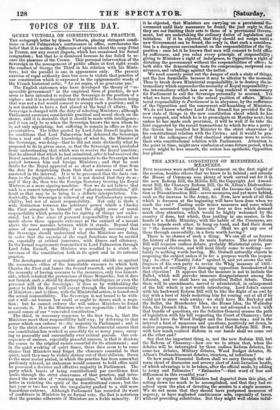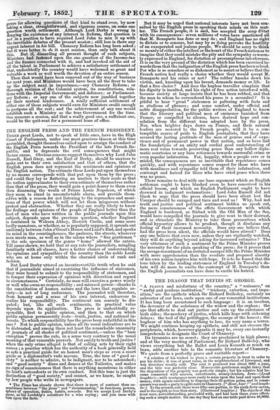THE ANNUAL CONGESTION OF MINISTERIAL MEASURES.
FiVlS measures were notified by Government on the first night of the session, besides others that we know to be behind ; and already the House of Commons sees plenty of work carved out for it in the new Reform Bill, the Militia Bill, the Copyright Act Amend- ment Bill, the Chancery Reform Bill, the St. Alban's Disfranchise- ment Bill, the New Zealand Bill, and the Income-tax Continua- tion or Discontinuation Bill—seven measures, and yet more behind, such as the increase to the Army, &c. Now, how much of all this which is foreseen at the beginning will have been done when we reach the end ? Casting aside minor measures and some which may be accounted urgent, here are four or five which demand much close attention, which would be highly welcomed by the country if done, but which, thus jostling in one session, in the hands of a feeble Ministry, with the habits of the Commons, are sure to impede each other, to hang on hand, and find their doom in " the massacre of the innocents." Shall we get any one of these through successfully, in a form worth having ? There is no chance of such a thing. We can all of us foresee the history of the session in its main features. The new Reform Bill will occasion endless debate, probably Ministerial crisis, per- haps general election, and will most likely come to nothing—cer- tainly to nothing worth having. Mr. Disraeli naturally objects to reopening the subject unless it be for a purpose worth the reopen- ing; he cites " Finality John" against it, and yet avows the wil- lingness of his own party to revise the Whig measure of 1831: how much of cavilling yet damaging opposition foreshadowed in that objection ! It appears that the measure is not to include the Ballot, which will provoke immense disappointment among the Liberals, and we shall have an episodical Ballot debate. Then there will be amendments, moved or adumbrated, in enlargement of the bill which is not worth introducing. Lord John's career with his backward Reform Bill will be like the flight of an owl by day with a host of birds molesting him for coming out at all if he could not be more wide awake : we shall have Mr. Berkeley and the Ballot, the Manchester Idea, the Hume Idea, the Walmsley Idea, the Disraeli Idea. Yet have we not advanced a week with that bundle of questions, ere the Solicitor-General crosses the path of legislation with his bill respecting the Court of Chancery ; later we shall have the Wood Budget and the Income-tax ; and in the interval a host of measures and questions, positively set down, in malice prepense, to interrupt the march of that Reform Bill. Now, with how much realized Reform in our hands shall we come out at the other end ?
Say that the important thing is, not the new Reform Bill, but the Reform of Chancery—how are we to attain that, when the debates will be interrupted by those endless Reform debates, In- come-tax debates, Military debates, Wood Budget debates, St. Alban's Disfranchisement debates, etecetera, ad infinitum ?
Or how much Financial Reform shall we carry through the ad- verse cloud of discussion and arrowy sleet of Anti-Invasion bustle, of which advantage is to be taken, after the official mode, by adding to Army and Estimates P "Estimates "—that word of fear and diffuseness in this eventful year !
Let us suppose that Ministers had departed from this plan, of setting down too much to be accomplished, and that they plan, re- solved upon the plan of devoting the session to a single measure. We do not mean that they should have postponed measures of urgency, or have neglected continuance acts, especially of taxes, without providing substitutes. But they might well obtain indul- race for allowing questions of that kind to stand over, by now taking a clear, straightforward, and vigorous course, on some one enestion worth settlement. Although Lord Derby is wrong in denying the existence of any interest in Reform, that question is not in a position to have required Lord John to mix it up with the inevitable debates of the present session ; still less is there any urgent interest in his bill. Chancery Reform has long been asked; but it were better to do it next session, than only talk about it this. But if, discarding all present thought of such subjects, Ministers had fastened upon the one question of the Income-tax and the finance connected with it, and had invoked all the aid of all the talent in Parliament to achieve a satisfactory settlement of Mat, undoubtedly the country would have welcomed so great and valuable a work as well worth the devotion of an entire season. Then that would have been removed out of the way of business for next year, and Ministers would have been all the freer to take up the subject, next in importance,—say Chancery Reform; or thorough revision of the Colonial system, its constitutions, rela- tions with the Imperial Government, and defences; or Parliament- ary Reform ; or any one of the subjects now jumbled together for their mutual lunderance. A really sufficient settlement of either one of these subjects would earn for Ministers credit enough to postpone all the rest ; and the achievement of any one would establish such a Ministry as the true Government for the time. One measure a session, and that a really good one, a sufficient one, would be the quit-rent for a permanent lease of dace.



























 Previous page
Previous page